|
|  |
|
September 2, 2025
|
|
UK - First Milk strengthens returns to members with 20% surge in turnover
First Milk has delivered a 20% surge in turnover to £570 million, alongside a rise in profits, as it integrates BV Dairy and accelerates its regenerative farming agenda. The dairy co-operative has posted a robust set of results for the year ending 31 March 2025, highlighting both financial strength and progress on its regenerative farming commitments.
The Annual Financial and Impact Report, published 28 August, revealed turnover of £570 million, up 20% on the previous year's £476 million.
Growth was driven by the full-year effect of its February 2024 acquisition of BV Dairy, coupled with increased sales of milk, whey protein and chilled speciality products.
Operating profit climbed to £20.5 million, compared with £16.8 million last year, while total group capital and reserves rose to £62.5 million from £58.5 million in 2024.
Despite significant investment, First Milk said it had kept net debt "broadly stable" at £66 million, just above last year's £64.9 million, while also paying off outstanding loan notes linked to the BV Dairy deal.
Strategic investment of £4.7 million included £3.9 million in capital projects at its cheese creameries in the Lake District and Pembrokeshire.
The integration of BV Dairy is progressing at pace, with First Milk introducing a new structure comprising three business units: BV Dairy, Cheese, and Milk.
This reorganisation, the co-operative said, was designed to sharpen customer responsiveness and maximise opportunities generated through farmer-led Regenerative Farm Plans.
Land enrolled in its regenerative programme rose by 6% to 89,977 hectares, while members achieved a 3.2% cut in carbon intensity to 1.13 kgCO2e per kg of fat and protein corrected milk. Soil carbon sequestration more than doubled to 203,000 tonnes CO2e, up from 114,000 tonnes last year.
FarmingUK
|
|
|
|
|
UK - Dairy farmers urged to disinfect water lines pre-housing after hot summer
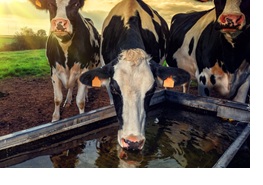 Dairy farmers preparing to house cows for winter are being urged to clean and disinfect water lines to remove harmful pathogens that may have built up during the hot summer.
Dairy farmers preparing to house cows for winter are being urged to clean and disinfect water lines to remove harmful pathogens that may have built up during the hot summer.
Troughs and pipelines left stagnant over summer - particularly in hot weather - can quickly become breeding grounds for bacteria and biofilms. These not only clog up water systems but also reduce palatability, intake, and could harm herd health, warns biosecurity specialist Nigel Bennet from Roam Technology.
"Left unchecked, contaminated water becomes a hidden reservoir of disease that can damage herd health and eat directly into milk yields and farm profitability," he says.
"Pathogens like Cryptosporidium parvum can survive six months in water, Salmonella for 50 days, and E. coli for up to a year. Campylobacter and enteric viruses, such as rotavirus and norovirus, thrive in biofilms inside water lines, creating a constant source of reinfection."
Biofilm forms when free-swimming microbes, such as bacteria, attach to surfaces in water systems and secrete sticky, glue-like substances that create a protective matrix. This allows bacteria to multiply and form persistent communities, creating potential reservoirs for pathogens as well as management issues like blocked lines.
"Water is the most critical nutrient for dairy cows - yet it's often ignored. High-yielding cows can drink up to 250 litres a day. Contaminated water reduces intake, disrupts rumen function, and can damage fertility - all of which directly affect production and profitability."
Carson Pridham of Intemax, specialists in livestock water systems, adds that problems are widespread: "The water in the majority of troughs I see is far from potable- you can see the build-up of biofilm in the drinker. Other times, farmers report reduced intakes without realising water quality is the cause. When we test water and take bacterial samples, the results are often a shock."
Roam Technology and Intemax are working with increasing numbers of dairy farmers to help improve water hygiene and support production. Their recommended approach is to thoroughly clean the water system and then keep it clean with constant dosing - a process routinely seen on pig and poultry farms.
Intemax uses Huwa-San TR-50, a 50% silver-stabilised hydrogen peroxide disinfectant from Roam Technology. It destroys bacteria, viruses, fungi and biofilms, while safely breaking down into water and oxygen with no harmful residues.
"Regular water treatment protects herd health and maximises water intake and milk production," adds Mr Pridham. "Calves also need clean water from day one to develop a healthy rumen. By weaning, they may drink up to 12 litres a day - hygiene is critical for lifetime performance."
Animal welfare regulations also require livestock water to be of sufficient quality, and retailers are increasingly monitoring standards.
www.roamtechnology.com
|
|
|
UK - From data to decisions: Turning numbers into insight, report AHDB
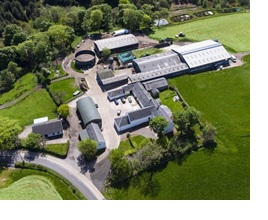 Rising production costs continue to affect the dairy sector globally, with key exporting regions seeing a 14% increase in cost of production between 2019 and 2024. Knowing your numbers has always been central to running a successful farm business. With an increasing range of user-friendly accounting tools available, getting started is easier than ever.
Rising production costs continue to affect the dairy sector globally, with key exporting regions seeing a 14% increase in cost of production between 2019 and 2024. Knowing your numbers has always been central to running a successful farm business. With an increasing range of user-friendly accounting tools available, getting started is easier than ever.
Yet, for many farmers, adopting new systems can feel daunting. It's not just about the numbers; it's about opening up the inner workings of a business that's often closely connected with family life.
Add in unfamiliar terms like nominal codes and enterprise allocations and it's easy to understand why many are hesitant.
Discover how Marion Campbell with her husband Tom and son David at Low Ballees in Ayrshire, transformed their farm's financial management.
Read more about their journey from data to decisions on the AHDB website.
|
|
|
UK - Maximise calf health and future herd performance with CowManager
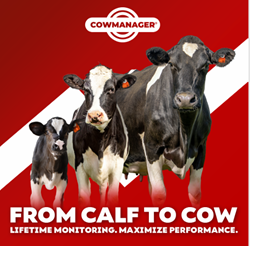 Raising healthy calves is the foundation of a productive dairy herd. With CowManager's new innovative Youngstock Monitor, extending our proven Cow Monitoring platform, you gain real time insights into each calf's health and behaviour allowing for timely interventions, reduced treatment and improved calf welfare. The system also boosts labour efficiency and overall farm performance.
Raising healthy calves is the foundation of a productive dairy herd. With CowManager's new innovative Youngstock Monitor, extending our proven Cow Monitoring platform, you gain real time insights into each calf's health and behaviour allowing for timely interventions, reduced treatment and improved calf welfare. The system also boosts labour efficiency and overall farm performance.
Powered by Artificial Intelligence and continuously evolving algorithms, the system learns from your specific farm environment and adapts to each calf's individual behaviour. Early health issues are delivered in real time smart alerts to your phone or online dashboard and you see the development graph of that specific calf.
Introducing Youngstock Monitor sets CowManager apart by enabling you to monitor your animals throughout their entire lifecycle. Using the same lightweight ear sensor, the Lifetime Monitoring system supports your herd from calf to cow, ensuring optimal health, growth, and productivity at every stage.
Youngstock Monitor is the perfect addition to your calf-rearing strategy, helping you lay the groundwork for a stronger, more resilient herd. It's not just about detecting illness, it's about preventing problems before they escalate.
Want to see how it works? Visit us at UK Dairy Day in Telford on the 10th of september. You'll find us on stand H219, where our team, including World Wide Sires UK's Ben Nottage, will be ready to show you how CowManager can transform your youngstock management.
www.cowmanager.com
|
|
|
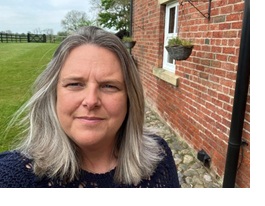 Karen Bond BVMS MSc MRCVS - NMR Vet Team Lead
Karen Bond BVMS MSc MRCVS - NMR Vet Team Lead
Karen leads NMR's dedicated vet team. After many years in dairy practice, research and knowledge transfer, she now uses her experience and expertise to help farmers and vets effectively manage Johne's disease on farm. She has contributed to many peer reviewed papers on the subject and is part of both the management and technical groups of Action Johne's, helping to create and steer the National Johne's Management Plan.
You've been testing for a long time and feel like you're doing everything you can to reduce Johne's in your herd but after initial success you seem to be getting nowhere…
Sound familiar? Time to take a step back and make sure you're utilizing all of the tools available and your focus is in the right place.
When you quarterly test your whole herd for Johne's, you are maximizing your chances of identifying high risk cows. But those farmers who choose to test with NMR's HerdWise scheme can get so much more than just red, amber and green classification for their cows.
If you use NMR's HerdWise, you can find out which of your cows are Priority Culls, check out the Johne's status of their dam, look at each cow's detailed testing history and your herd's full Johne's history.
HerdWise provides you and your consultants, most specifically your vet, with exclusive access to the NMR Johne's Progress Tracker. An easy, visual way to see just how effective different parts of your Johne's management plan are. This can really highlight areas that need focus and improvement.
For example you and your vet can tell if a herd is culling heavily for Johne's (high removal rate) but isn't preventing new infections (high J4%), which can help you put new management protocols in place.
NMR Johne's Clinics @ Dairy Day Come and speak to Karen Bond on the NMR Stand (Ludlow L18) at Dairy Day on 10th September, where she'll be running Johne's Clinics throughout the day.
|
|
|
UK - 80% of farmers worry for survival, CLA poll finds
A new poll of 500 farmers and landowners has revealed how the government's 'family farm tax' is wrecking trust, livelihoods and Labour's future in rural seats.
The survey, conducted by the Country Land and Business Association (CLA), has highlighted the far-reaching consequences of the Treasury's plans to cut vital inheritance tax reliefs for farms and family businesses from April.
Nearly 80% of respondents said they are worried their business will not survive the next ten years, while over 60% have considered selling their farm and leaving the industry. Not a single respondent of the 500 said they would vote for Labour at the next election, while 36% said they would back Reform, with the Conservatives on 38%.
Earlier this summer the Treasury published an impact assessment of the changes, along with the draft legislation of the policy. It claimed capping inheritance tax reliefs will not have "any significant macroeconomic impacts". The assessment argued it "is not expected to have a material impact on food security" and "would not be expected to impact the UK's ability to source imports from international markets".
The findings of this new survey cast doubt on these claims. Victoria Vyvyan, CLA President, said: "The Treasury says these reforms will barely touch rural Britain. Our polling shows they will force hard choices on farms that have sustained communities for generations - selling their land, laying people off, shelving plans for the future. "Already, families are weighing up which parts of their business they can afford to keep. Some are holding back investment; others are wondering if they can hand the farm on at all.
"Rural Labour MPs can see what's coming. They know it will drain the life from the countryside and strip away the trust of the people who sent them to Westminster. If they support it, their voters won't forget."
Meanwhile 69% of respondents said they will have to sell land or take out loans to keep the business - with nearly half predicting they'll have to sell at least a quarter of their farm. It also found 89% have paused or delayed investment since the budget, with 27% saying they have held back from investing over £150,000.
A separate study earlier this year, commissioned by Family Business UK and conducted by independent consultancy CBI-Economics, found that more than 200,000 jobs could be lost during this Parliament. The changes could produce a net fiscal loss of £1.9 billion for the Treasury and wipe £14.9bn from the economy in lost business activity, it concluded.
CLA
|
|
|
|
|
UK - One year into the AHDB baselining pilot - What have we learned?
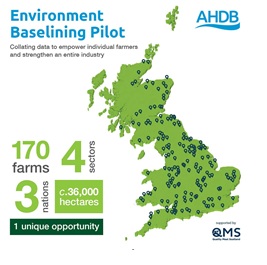 UK - One year into the AHDB baselining pilot - What have we learned?
UK - One year into the AHDB baselining pilot - What have we learned?
The environmental baselining pilot, led by AHDB and supported by QMS, promises to empower farmers with unique data and insight that will drive change, forging a fairer and more resilient path towards becoming net zero by 2050.
One year into the pilot, Chris Gooderham, AHDB Environment Director, reflects on the progress and learnings. Discover the challenges faced, the insights gained from LiDAR scanning and carbon audits, and the exciting next steps for this pioneering initiative.
Read the full article on the AHDB website to learn more about how this pilot is redefining the recognition of farmers' environmental contributions and shaping the future of British agriculture.
|
|
|
UK - How can aisle design and packaging influence milk shoppers?
Research undertaken by the Agriculture and Horticulture Development Board (AHDB), in collaboration with Linney and milk processors including Müller UK & Ireland, aimed to understand how to improve shopper engagement with the milk aisle and pack and improve long-term perceptions of the industry.
The wider dairy category is the most valuable of the grocery categories, equating to £16.4 billion spend (NIQ, 52 w/e 12 July 2025), being present in more shopping baskets than any other category. However, earlier this year the AHDB/YouGov Consumer Tracker revealed that around 1 in 5 claim they are thinking about cutting back on dairy products.
Emma Wantling, Retail and Consumer Insight Manager at AHDB, said: "Our 'Optimising milk in-store' research aims to help retailers and processors by providing evidence as to what shoppers are looking for in aisle and on pack that would influence behaviour and, in turn, protect and grow sales.
"This study follows AHDB's 2024 meat labelling and aisle research that resulted in aisle redesigns and point of sale optimisation for multiple major retailers."
The AHDB/Linney research involved a quantitative survey of milk shoppers to streamline and prioritise the most impactful communication routes and a consumer immersion phase, including themed 3D virtual aisles and testing of 4,096 unique pack combinations.
Results showed that, for the aisle, having communication around the natural nutritional benefits of milk performed strongest. When adding health communication in aisle, 25% of shoppers claimed they would purchase more milk than usual. The most effective health message tested was "Milk naturally contains 7 vitamins and minerals - vitamins B2, B5 and B12, calcium, iodine, potassium and phosphorus", resulting in the aisle being seen as high quality, inspirational and exciting.
On pack, consumers were clear that farming communication was of most importance. Cow-centric visuals of animals grazing performed best alongside farming messaging such as "Dairy produced in the UK is to world-class food and farming standards".
Becs Goodwin, Category Development Controller at Müller, said: "AHDB's fixture and packaging strategy is built on deep consumer insight, and Müller is proud to be part of the work to shape the fixture of the future.
"This collaboration reflects our shared ambition to reinvigorate the dairy aisle and inspire consumers with the benefits of milk, and we're looking forward to engaging with our retail partners to help them deliver a more impactful and engaging experience in-store."
To read the full AHDB milk research report visit: ahdb.org.uk/knowledge-library/consumer-insights-optimising-milk-in-store
For more AHDB insights, sign up to the Retail and Consumer Insights webinar this autumn: ahdb.org.uk/events/retail-and-consumer-insight-conference-2025
Source: AHDB/Linney re-thinking milk research 2025
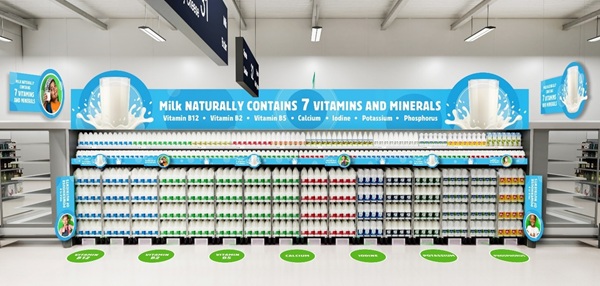
|
|
|
UK - Three finalists shortlisted for 2025 Women in Dairy Award
The winner will be announced on 17 September at the Women in Dairy Conference at Chesford Grange Hotel, Kenilworth. The award celebrates the achievements of women in the dairy sector, recognising individuals who demonstrate the Women in Dairy values of connect, share, and inspire.
Finalists are:
Claire Whittle - Vet and Farmer, North Wales
Claire combines her work as a practising vet with farming and consultancy, championing regenerative agriculture and ecosystem health. From social media posts to dung beetle safaris and webinars, she connects with farmers nationwide, sharing her expertise and inspiring positive change in dairy farming.
Jane Barnes - Farmer, Melton Mowbray, Leicestershire
Jane runs Farmer Barnes Dairy with her husband and son, producing milk for world-famous Stilton cheese while welcoming thousands of visitors to the farm. She shares her knowledge through farm tours, talks, and workshops, inspiring the next generation and acting as a passionate ambassador for the dairy industry.
Judy Dilks - Farmer, Hassop, Derbyshire
At Simply Milk Organic, Judy combines calm leadership with a focus on sustainability, animal welfare, and education. She connects with the community through school visits, farm tours, and Open Farm Sunday events, sharing knowledge and inspiring both young farmers and the wider public.
This year's Women in Dairy Conference, sponsored by HSBC and Smaxtec, features a packed agenda of motivational speakers.
More information is available at www.womenindairy.co.uk.
|
|
|
UK - Smart choices for a profitable tomorrow -practical guidance for preventing Johnes
Join AHDB at one of our GB-wide meetings designed for your whole farm team to equip you with the tools, knowledge and confidence to take the next step in Johne's disease control.
Whether you have an existing plan or are struggling to know where to start, these events will offer practical guidance, share real-farm experience and give you expert advice to help refine your Johne's plan, reduce disease prevalence and improve overall herd health.
When and where:
- 25 September - Kippen, Stirling
- 2 October - Coton in the Clay, Staffordshire
- 2 October - Pwllheli, Gwynedd
- 8 October - Lewes, East Sussex
- 8 October - Newcastle Emlyn, Ceredigion
- 14 October - Dorchester, Dorset
- 15 October - Bewdley, Worcestershire
- 22 October - Cherhill, Calne, Wiltshire
- 18 November - Goosnargh, Lancashire
- 26 November - Falmouth, Cornwall
Any steps taken to tackle Johne's have a cascade impact in control of other diseases in your herd too, so starting today is a smart choice for a profitable tomorrow.
The meetings will cover:
- Making the most of milk recording data
- Johne's control through better calf hygiene
- Managing cows during calving according to their infection status
- Critical biosecurity principles: biocontainment and bioexclusion
- Fine tuning your team approach to on-farm behaviour change
You'll hear directly from the host farmer and their vet, who will share their experience managing Johne's - whether that's maintaining a low-risk herd or tackling current challenges.
Book your place today
|
|
|
UK - Clarkson's farm inspires rise in UK agriculture students
Applications for the Royal Agricultural University's three-year BSc in Rural Land Management have risen by 11%, The Times reports. Demand for the same course with a farm placement is up 18%, while interest in the RAU's two-year rural land management foundation degree has increased by 14%.
Daniella Miles, Head of Student Recruitment at the RAU, said the programme's impact is clear. She told The Times: "It seems to be spreading much further than 'I can do farming', as it's an interest in all the other courses and roles involved in farming that is increasing as well."
Charlie Ireland, the land agent known as 'Cheerful Charlie' on the Amazon Prime series, is believed to have influenced younger audiences in particular.
Andrew Black, lecturer on the Land & Property Management course at Harper Adams University, explained the wider impact. He said: "The impact of Charlie's role in Clarkson's Farm is far more wide-reaching - and we are starting to see a ripple effect in numbers of students enrolling on our open days as a result."
He added that Charlie's approach is particularly valuable for students: "What I really appreciate about Charlie's role in the show is his no-nonsense approach and his broad, expert knowledge on the complexities of key areas of professional practice a land agent would come into contact with, including planning laws, agricultural management, budgeting, finance, construction, property law, machinery purchasing, valuation and negotiation."
He highlighted the variety the career offers: "One of the greatest things about being a land agent is that no day is the same, and you are required to think on your feet and work through problems."
Data from UCAS in 2024 shows that agricultural courses are seeing steady growth. The number of applicants accepted rose by 8% for the second consecutive year. Applications from 18-year-olds to agriculture, food, and related degrees jumped nearly 20%, reaching more than 9400 compared with around 7900 in 2019.
ScottishFarmer
|
|
| |
BRITISH DAIRYING
ENSURE YOU RECEIVE EVERY COPY
British Dairying is available by subscription at £70.00 posted to UK addresses,
£90.00 for Europe, £115.00 for the Rest of the world
or £30 +VAT for British Dairying Online only
|
|
|
QUOTE
"The trouble with having an open mind, of course, is that people will insist on coming along and trying to put things in it."
Terry Pratchett - Author, Humourist, 1948-2015
"Always remember that you are absolutely unique. Just like everyone else."
Margaret Mead - Cultural Anthropologist & Author, 1901-1978
|
|
| |
|
|
|
You are receiving this email because you are a registered reader of British Dairying and we are pleased to send you extra information to supplement the journal.
|
|
|
British Dairying,
WB Publishing Ltd
Priory Cottage, Eastbourne Road Ridgewood East Sussex TN22 5ST
WB Publishing Ltd is registered in England and Wales, Registration No 2951727
|
|

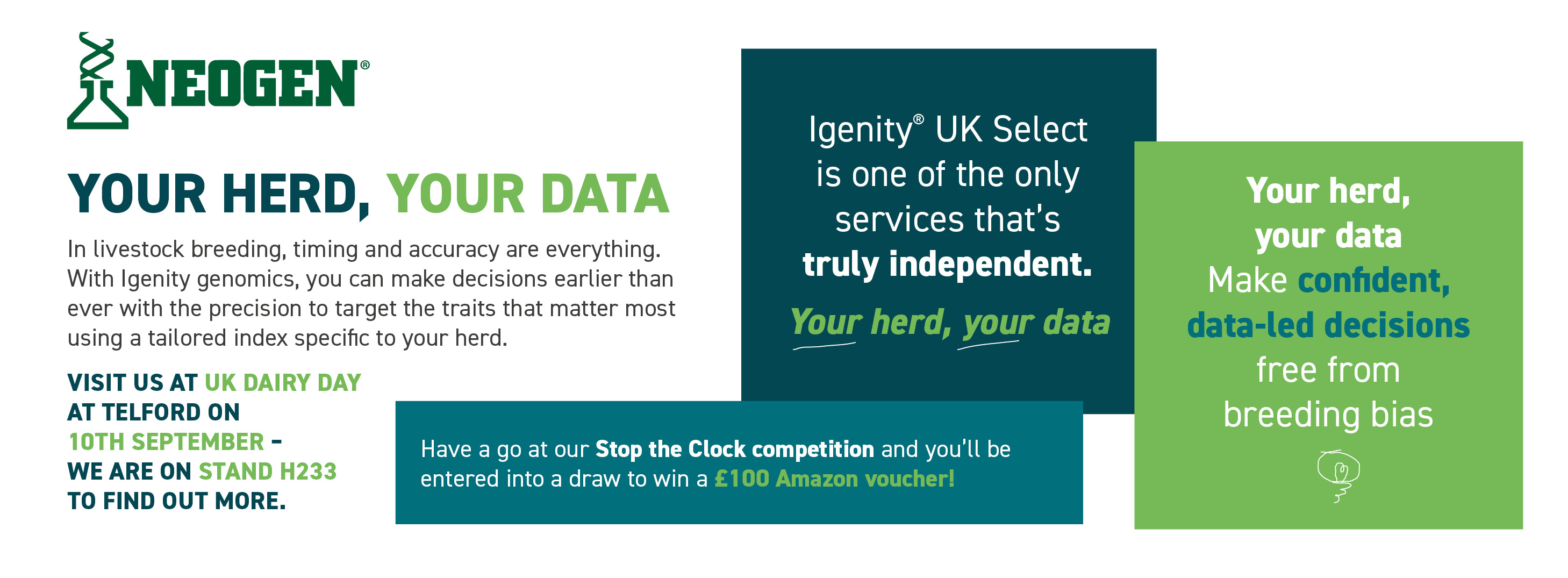
 Dairy farmers preparing to house cows for winter are being urged to clean and disinfect water lines to remove harmful pathogens that may have built up during the hot summer.
Dairy farmers preparing to house cows for winter are being urged to clean and disinfect water lines to remove harmful pathogens that may have built up during the hot summer.
 Rising production costs continue to affect the dairy sector globally, with key exporting regions seeing a 14% increase in cost of production between 2019 and 2024. Knowing your numbers has always been central to running a successful farm business. With an increasing range of user-friendly accounting tools available, getting started is easier than ever.
Rising production costs continue to affect the dairy sector globally, with key exporting regions seeing a 14% increase in cost of production between 2019 and 2024. Knowing your numbers has always been central to running a successful farm business. With an increasing range of user-friendly accounting tools available, getting started is easier than ever.


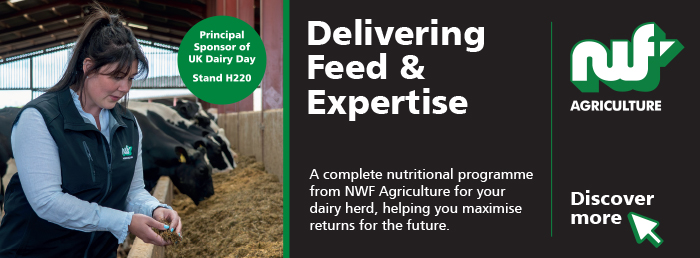
 UK - One year into the AHDB baselining pilot - What have we learned?
UK - One year into the AHDB baselining pilot - What have we learned?

